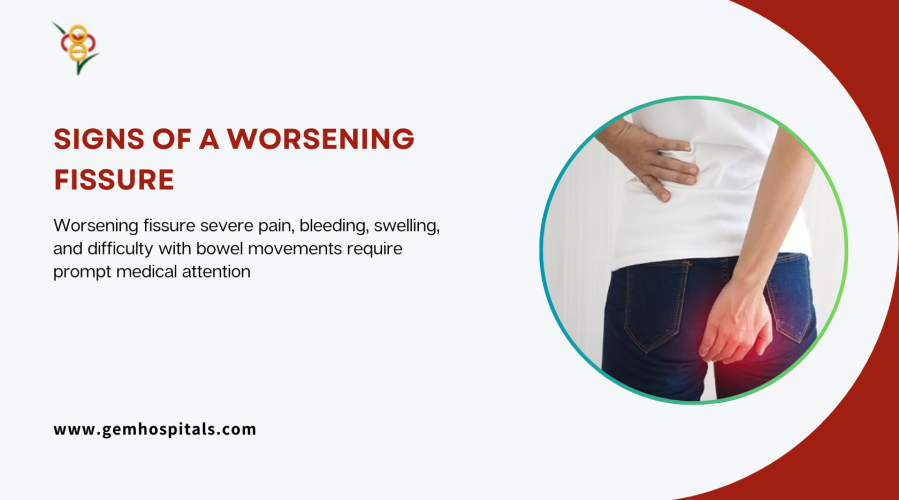Learn what gallstones are, their common symptoms, causes, and treatment options. Discover when to seek medical care and how to manage gallstone complications effectively.
What Are Signs of a Worsening Fissure?

Anal fissures are small splits in the skin around the anus that may be painful when passing stool. Although minor cracks may heal without medical intervention, a deepening crack may cause severe pain, complications and may require the attention of a doctor. In this blog, you will learn more about the symptoms of a worsening fissure and when to seek medical attention.
Understanding an Anal Fissure
Anal fissure usually results from an injury to the anal canal, although it may be attributed to hard stool passage, constipation or chronic diarrhea. It results in such manifestations as sharp pain especially during defecation, blood discharge and itching. These symptoms may be relieved by good care but some fissures do not recover and become chronic and progress to the worse.
Key Signs of a Worsening Fissure
1. Persistent Pain
- Sharp or Stabbing Pain: Any pain one experiences during or after defecation and if the pain increases in severity then this is a sign that the fissure is worsening.
- Pain Lasting Beyond Bowel Movements: Constant pain at any time of the day is a sign.
2. Increased Bleeding
- Bright red blood in the stool or on toilet paper is typical with fissures, though more blood may indicate that the fissure is becoming deeper.
3. Swelling Around the Anus
- Some symptoms that may be associated with an infected or inflamed area around the anus include; swelling, redness or tenderness.
4. Recurring Fissures
- If the fissure has healed, but it reappears periodically, it may be a sign of other problems like muscle spasms or other problems.
5. Formation of Skin Tags
- Skin tags may also form around the fissure area and may be painful or itchy.
6. Foul-Smelling Discharge
- The crack may widen and cause infection that brings about pus or some form of discharge that has an unpleasant smell and this is a sign that the person needs to see a doctor.
7. Difficulty Passing Stools
- Pain and fear of defecation causes constipation, which aggravates the situation and increases the likelihood of further tearing.
When to Seek Medical Attention
If you are experiencing any of the above signs, then you should consult a professional. GEM Hospital offers the Best Fissure Treatment so that the patient can recover quickly. chronic symptoms might need other lines of treatment such as pharmacological, botulinum toxin injections, or surgical management.
How GEM Hospital Can Help
At GEM Hospital, we offer a comprehensive approach to managing and treating fissures:
1. Accurate Diagnosis
Our experts employ modern methods of determining the extent and nature of the fissure you are suffering from.
2. Tailored Treatment Plans
We develop individualized care programs and may use diet and exercise, drugs, or endoscopic procedures.
3. Surgical Expertise
In cases of chronic or severe FMS, our surgeons are able to perform procedures such as lateral internal sphincterotomy to give long-term relief.
Praised for its Jaundice Treatment in Chennai, GEM Hospital is equally popular for the treatment of fissures and other gastroenterological disorders.
Managing and Preventing Worsening Fissures
1. Maintain Soft Stools
- Intake of fiber should be boosted from fruits, vegetables and whole grain products.
- Drink a lot of water to prevent constipation.
2. Use Sitz Baths
- Baths in warm water can help with pain and can speed up the healing process.
3. Avoid Straining
- Healthy bowel movement should be practiced by attending to the call for a bowel movement.
4. Follow Medical Advice
- Take the prescribed drugs or creams as advised by your doctor.
Complications of Untreated Fissures
A worsening fissure can lead to:
- Chronic pain and discomfort.
- Development of abscesses or formation of fistulas.
- Chest infections that may take a long time to heal.
Book a Consultation
Do not dismiss the symptoms of a deepening crack. Come to GEM Hospital for professional treatment and efficient treatment. Our services include the Best Fissure Treatment for you according to your situation. Please contact us today to book an appointment and avoid late intervention.
Blogs & Article
Learn about bloating and gas problems, including common causes, symptoms, and effective solutions to improve digestion, reduce discomfort, and maintain gut health.
Learn how unverified Ayurveda treatments may cause liver damage, understand the risks, symptoms, and why medical guidance is essential for safe care.


